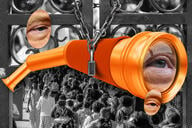You have /5 articles left.
Sign up for a free account or log in.
If it were any other campus, the idea of a bake sale inciting multiple, racially charged protests over several days might seem far-fetched. But not at the University of California at Berkeley.
For the past week, students on campus and national media outlets have been consumed with talk of an "Increase Diversity Bake Sale" put on by the College Republicans on Tuesday. The catch? The bake sale planned to charge different amounts to students of different races and gender. According to announcements circulated by group members, white males would be charged $2.00 for a cupcake, Asian/Asian-American males $1.50, Latino/Hispanic males $1.00, black males 75 cents, and Native Americans 25 cents. Females of each group would pay 25 cents less.
In reality, the group said, everyone would be allowed to pay what he or she chose. The real point to the effort was to get attention. The group's members – who have been called racist and received threats of violence – organized the bake sale to protest a bill before Governor Jerry Brown that would grant the state’s universities the ability to consider race in the admissions process, a consideration that was outlawed by a state constitutional amendment passed by voters in 1996.
“We agree that the event is inherently racist, but that is the point,” said Shawn Lewis, president of the Berkeley College Republicans, in a statement posted on the group’s website earlier this week. “It is no more racist than giving an individual an advantage in college admissions based solely on their race or gender.”
The conflict and attention over the bake sale – and the bill underlying it – show the heated emotions surrounding unsettled questions about how admissions officers can or should consider race during the college application process, not just in California, but across the country.
The bake sale itself was a protest against a phone bank organized by the student government to lobby the governor in support of the bill. Reports said about 50 students participated in the phone bank while several hundred gathered on campus to advocate for or against the bake sale. Over the years similar bake sales have been organized by conservative student groups on campuses confronting questions of race in the admissions process, though none has attracted as much attention as the Berkeley sale.
The Republican group faced several protests Tuesday during the four-hour bake sale. A group of about 300 students wearing black gathered and lay in the middle of Sproul Plaza, a gathering place for students on the university's campus where the bake sale was held. A different group encircled the bake sale and chanted, challenging the Republicans to a debate on the merits of affirmative action. Another group gave away "conscious cupcakes" to individuals in another area of campus in protest of the confrontational way Republicans pushed their message.
Race in California
California universities have a long history of dealing with and fighting over affirmative action. The Bakke case, on which the U.S. Supreme Court ruled in 1978, involved the university's admissions policies. The ruling upheld the consideration of race along with other factors in the admissions process, but barred the use of quotas. In 1996, the state was the first to adopt a constitutional amendment – known as Proposition 209 -- prohibiting the consideration of race and ethnicity in the admissions process. Similar amendments have since been adopted in several other states, including Michigan, Nebraska, and Arizona.
The first section of California's amendment says the state "shall not discriminate against, or grant preferential treatment to, any individual or group on the basis of race, sex, color, ethnicity, or national origin in the operation of public employment, public education, or public contracting."
A study by the University of California about the impact of implementing Proposition 209 found "a substantial decline in the proportion of entering students who are African American, American Indian, and Latino" between 1995, the year before the amendment's adoption, and 2002, the year the study ended. Since the state adopted Proposition 209, both the UC system and the California State University system have engaged in several efforts to increase the number of underrepresented students on public university campuses, including outreach efforts. With large Asian enrollments as well as some rebound in the enrollment of black and Latino students, many public campuses in California are quite racially diverse, and white students do not make up a majority. But at the most competitive institutions, black and Latino enrollments lag their share of the population.
Admission to all UC institutions is based on a comprehensive application review process that weighs not only academic achievement and extracurricular activities, but also "academic accomplishments in light of your life experiences and special circumstances" and the location of a student's secondary school and residence, which can help add diversity to the student body.
The bill before Governor Brown “would authorize the University of California and the California State University to consider race, gender, ethnicity, and national origin, along with other relevant factors, in undergraduate and graduate admissions, to the maximum extent permitted by the 14th Amendment to the United States Constitution, Section 31 of Article I of the California Constitution, and relevant case law.”
That language is somewhat confusing, law scholars say, because it seems to contradict the state constitution as amended by Proposition 209. The maximum extent permitted by the 14th Amendment – which the Supreme Court affirmed in 2003 allowed race to be considered in the admissions process as one factor among many – goes further than the maximum extent allowed by the state – which is prohibited from considering race at all. Brown's predecessor, Arnold Schwarzenegger, vetoed two similar bills during his term as governor, saying they violated Proposition 209.
Richard Sander, a law professor at UCLA who studies the effect of Proposition 209 and has advocated against affirmative action in college admissions, said he can't see an argument for how the bill gets around the constitutional prohibition.
Ricardo Vazquez, a spokesman for the University of California Office of the President, said the bill would not supersede the constitutional prohibitions already in place. "We have been advised that it would not change how we do admissions at the present time," he said. "None of our campuses take any of these factors into account, and whatever information a student provides with regard to race or ethnicity, the person reading the application has no access to that information."
Proponents of the bill have argued that ignoring race and surrounding social factors in the admissions process unfairly hurts underrepresented minorities. "It is time California adopt the law of the land and eliminate policies that discourage college-eligible students from pursuing a higher education," said state Sen. Ed Hernandez, the bill's sponsor.
If Brown ends up signing the bill, the state will likely face a legal challenge. Representatives from the American Civil Rights Institute – a group formed by Ward Connerly, the main proponent of Proposition 209 and a former University of California regent, to push similar amendments in other states – said they plan to take legal action if the bill becomes law. Connerly showed up at Berkeley Tuesday to help the Republicans at the bake sale.
Some scholars say the bill, if the courts rule in favor of it, could be a way to subvert the constitutional amendment instead of just repealing it through the ballot. Sander said that if political support for the bill is large enough, the language is somewhat irrelevant. “All courts are influenced by political realities,” Sander said. “If 95 percent of Californians were opposed to Prop 209, the court would probably uphold the constitutionality of the law regardless of what it says." But public opinion on the issue is mixed, so such a clear preference is unlikely. Also, six of the seven justices on the California Supreme Court were appointed by Republican governors who have opposed repealing Proposition 209.
California institutions have consistently denied that they consider race in the process now that Prop 209 is in effect, but officials have said that not considering race hurts underrepresented minorities in the admissions process. “We’d be ready for race-blind admissions if, when you looked through the K-12 system and the academic performance indexes for the different races, you saw no correlation,” Gibor Basri, Berkeley’s vice chancellor for equity and inclusion, told reporters from the student newspaper, The Daily Californian, during the bake sale. “Currently we are not there.”




